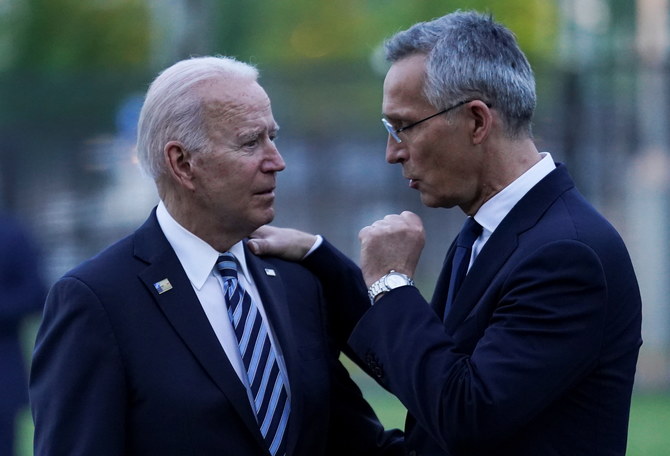Why the West’s rejuvenation is not yet complete

https://arab.news/4s8yz
The decline of the West became a dominant theme during the Donald Trump era, but its rejuvenation as a political force has been one of the key topics of discussion at the NATO and European Council summits this week.
While US President Joe Biden is widely criticized in the US, his presidency has helped rebuild and renew the transatlantic economic and political alliance, while also highlighting the areas in which international cooperation is most urgently needed.
With the unexpectedly unified Western response to Russia’s invasion of Ukraine in the last month, there is renewed confidence in the transatlantic alliance just over a year since Biden was sworn in as US president. This represents a reversal of the atmosphere from 2017 to 2021, when the dominant narrative was uncertainty about the enduring purpose of the West.
Of course, key questions about the future of the West predate Trump’s election as US president. Moreover, it is not just Trump who highlighted problems with these key alliances, as shown by the UK’s 2016 vote to leave the EU. But there is no question that Trump's presidency intensified the questions about the future of the West. This is why there has, since last January, been such urgency among the transatlantic partners to develop a joint strategy for a new era of great power competition.
However, the rejuvenation of the West as the world’s leading political and economic force is far from complete, even now. There is significantly more that is needed to accomplish Biden’s goal of seeing the Western community reunify against what he perceives as common threats from not just Russia, but also China.
To reset further, the first necessary step is for all key parties, including the EU, Canada and Japan, to acknowledge that, after the last half-decade, it may not be possible for the old liberal order to be brought back lock, stock and barrel. Desirable as that may still be for many, it is now abundantly clear that going back to the full panoply of the old rules-based international order may not be realistic.
This is not least because significant portions of the populaces in Western societies remain supportive of political disruptors such as Trump. Indeed, it is plausible that the former president may yet not only win the Republican nomination in 2024, but possibly the White House too, such is his continuing popularity.
Within the Western bloc, challenges are rife, including international trade and wider economic tensions. Recent years have seen Japan imposing tariffs on South Korea, while Italy has been at loggerheads with France and Brussels over its budget and migration. Meanwhile, Germany has disagreed with its eastern neighbors, including powerbroker Poland, over the rule of law and energy security.
Now is a good time to address these facts. And it is also the right moment to start exploring what a new Western-led approach to global governance might look like.
A prerequisite for enabling this goal is concentrating on the big strategic questions facing the West. These are multiple, going beyond Ukraine, and they will not be resolved as a result of this week’s series of summits.
For one, the EU and UK need to build on the 2021 Brexit trade deal to address festering issues like the Northern Ireland protocol and look into broader security and defense cooperation, which has been shown to be so important by the Ukraine crisis. A second consideration is the need for much of the wider transatlantic West, from Eastern Europe to the Americas, to agree that there are a range of economic, as well as military, challenges that are better met together. Another issue is the future of international trade a quarter of a century after the creation of the World Trade Organization. This system is creaking under the strain of sanctions imposed across the globe recently.
All key parties should acknowledge that it may not be possible for the old liberal order to be brought back lock, stock and barrel.
Andrew Hammond
What is needed is a multiyear dialogue under Biden’s presidency, with forums such as NATO and the G7, imperfect as they are, stepping up to the plate. NATO, for instance, has much continuing relevance, with a membership of countries with a collective population of about 1 billion. It remains one of the world’s most successful military organizations, helping underpin the longest period of sustained peace in the West’s modern history.
Meanwhile, the G7, which holds its next annual leadership meeting in Germany in June, will be another key forum in shaping the new West. The G7 has already been at the center of the transatlantic community’s approach to economic sanctions on Russia as a result of its invasion of Ukraine, with more measures expected this week.
Some skeptics will say that nothing big will change anytime soon. Yet this may be too pessimistic.
At this moment of geopolitical and economic crisis, 2022 might well be a decisive year to build the foundations of a renewed West — a project that would be galvanized if Biden were to be reelected in 2024.
- Andrew Hammond is an Associate at LSE IDEAS at the London School of Economics










































